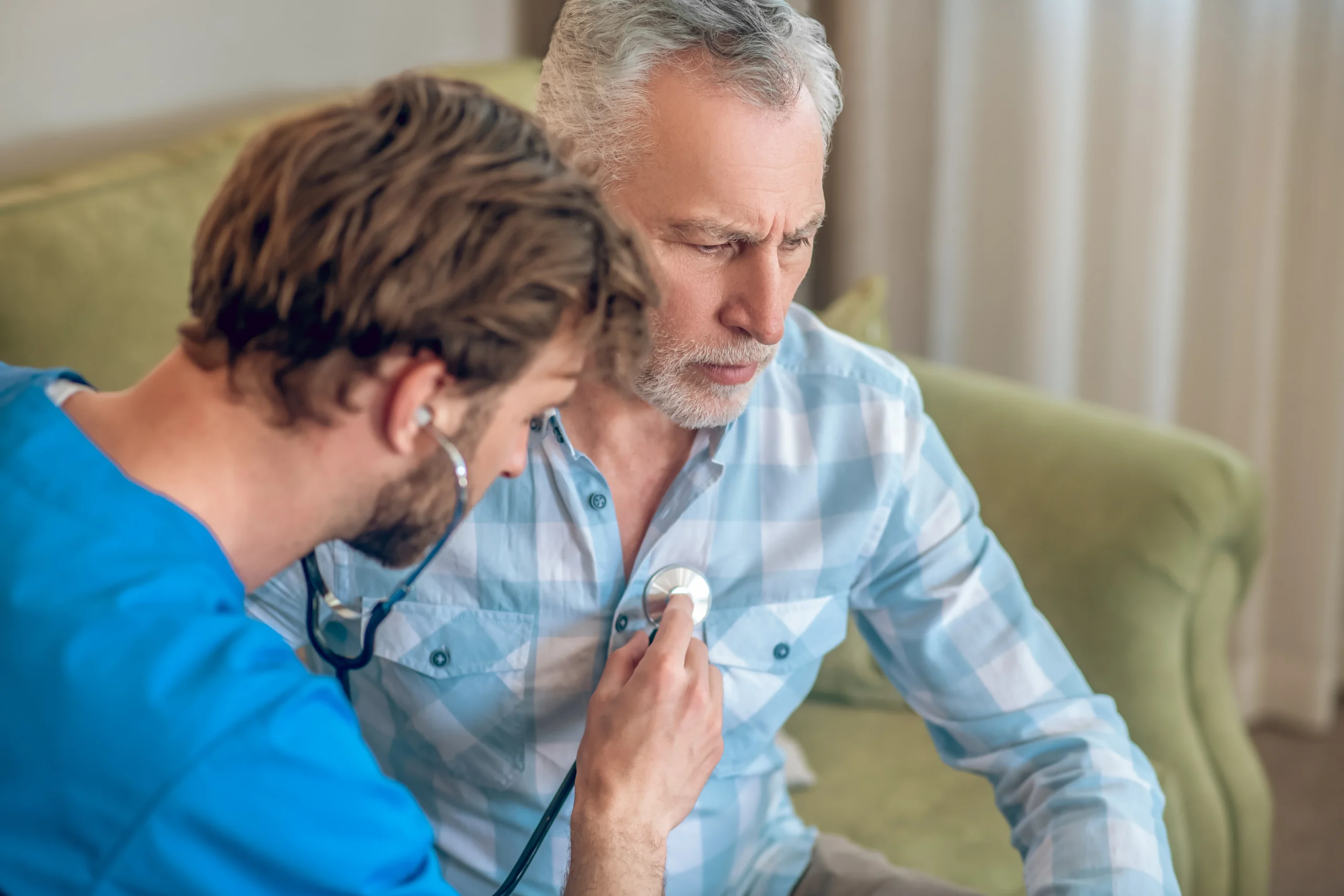If you’re like most people, you know the feeling well: all of a sudden, your heart seems to skip a beat. Or there’s a strange fluttering feeling in your chest. Or perhaps a heart-pounding sensation that wasn’t there two seconds ago.
These common symptoms are often the outward signs of ectopic beats – an early or extra beat in your heart, or a series of these beats.
Let’s be honest: nobody likes to experience heart flutters. They’re unsettling, unwanted and, sometimes, a little bit scary. But should you be worried about them? The good news about ectopic beats is that they’re very common, usually harmless and rarely a cause for concern.
But what if you’re getting more frequent ectopic beats, or multiple ectopic beats in a row, or if they’ve suddenly become more noticeable than before? How many ectopic beats are normal – and when should you be more concerned about them? In this blog, we’ll look at some of the answers:
In this article:
- What exactly are ectopic beats?
- What is a “normal” number of ectopic beats?
- When is an ectopic beat dangerous – and when should you seek help?
What Are Ectopic Beats?
An ectopic beat is an “extra heartbeat”: a beat that occurs prematurely or in addition to the regular contractions of your heart. Ectopic beats are common and can happen to anybody at any stage in life, though they become more common as we get older. They sometimes cause symptoms, such as a fluttering sensation or the feeling that your heart has skipped a beat (a palpitation). But they can also happen without you being aware of them at all.
There are two main types of ectopic beats:
- Premature atrial contractions (PACs) – the most common type, occur in the top chambers of the heart (the atria)
- Premature ventricular contractions (PVCs) – less common and happen in the bottom chambers (the ventricles)
How Many Ectopic Beats Are Normal?
The total number of ectopic beats you experience is known as a “burden,” and heart doctors generally consider a low burden to be fewer than 5,000 ectopic beats over a 24-hour period. That’s roughly 5% of your total heartbeats during a typical day. This may sound like a large number, but, if anything, it shows just how common it is to experience these “hiccups” in our heart rhythm. Almost everybody gets occasional ectopic beats, even people who are fit and healthy.
So what do cardiologists regard as an abnormal number of ectopic beats? As a rule of thumb:
- A moderate burden is considered to be from 5,000 to 9,999 ectopic beats over 24 hours
- A high burden is usually regarded as 10,000 to 19,999 ectopic beats over 24 hours
- A very high burden is more than 20,000 ectopic beats over 24 hours
A heart rhythm cardiologist would also want to look at the frequency of your ectopic beats. Quite often, ectopic episodes are very erratic. They can be very noticeable for a period of days or even weeks before disappearing completely, only to return some time later.
But it’s important to remember that “frequent” and “abnormal” are relative terms. Every person’s heart is slightly different, so what’s normal for one patient may be unusual for another. Also, the total number (/burden) of ectopic beats isn’t the only way that cardiologists will assess how they are affecting your heart.
How Long Can Ectopic Beats Last?
This is another measure of how the “rogue” beats are occurring within your heart, and the results can vary from one case to another. Some ectopic episodes will come and go in a few seconds. Others might last for several minutes, or much longer.
The pattern of the ectopic beats can vary, too. For instance, you could get a single extra beat just before your normal heartbeat. Or you might have a run of three, four, five or half a dozen extra beats in a row. A pattern that’s caused by premature ventricular contraction (PVC), on the other hand, could look something like this: one normal beat, followed by an extra beat in the ventricles, followed by a stronger-than-normal beat. But, again, it’s important to emphasise that the frequency, durations and patterns of ectopic beats are relative.
Why Am I Getting More Ectopic Beats?
If you’re experiencing new or noticeable ectopic beats, what might be causing them? In truth, it can be quite hard to say. We know that certain situations and substances can trigger ectopic episodes. These include:
- Lifestyle factors – caffeine, alcohol, smoking and even poor sleep can cause ectopic beats
- Stress and anxiety – highly stressful situations or bouts of anxiety are known to sometimes cause an arrhythmia
- Electrolytes – an imbalance (often due to dehydration) of the minerals that play a key role in many bodily functions
- Medications or stimulants – some medicines and illegal drugs can result in an ectopic beat
- Rigorous exercise – a high-intensity workout that gets your heart pumping
Less commonly, ectopic beats can be caused by an underlying health condition or problem with your heart. This includes conditions like atrial fibrillation (AFib), tachycardia, cardiomyopathy, heart disease, heart failure and chronic obstructive pulmonary disease (COPD).
If you’re concerned about ectopic beats – whether you’re noticing symptoms for the first time or they’ve been recurring for a while – we would encourage you to get them checked out by a cardiologist. You can get in touch with us here at Heart Rhythm Cardiologist to arrange a personalised ectopic beat consultation with Dr Lyne. It’s quick and easy to book an appointment, and we’ll be able to help you understand what’s going on.
When to Worry
If you notice a change in the frequency of your ectopic beats – for example, you’re getting heart flutters more regularly, or the episodes seem to be lasting longer than usual – it’s a good idea to see a doctor. They’ll be able to arrange some heart tests to see what might be happening, or whether you need to be referred to a cardiologist for further help.
Certain ‘red-flag’ symptoms should be treated as a medical emergency. You should seek immediate medical help if you experience:
- Dizziness or fainting
- Shortness of breath
- Chest pain or tightness in the chest
- Sudden, significant fatigue
- Swelling in the limbs, especially the feet, ankles and legs
When Not to Worry
And if you are experiencing ectopic beats, are they likely to be dangerous? In most cases, thankfully, the answer is no. If you’re worried about ectopic beats, keep in mind that:
- They’re very common – virtually everyone gets ectopic beats from time to time
- They’re normally harmless – most ectopic beats won’t damage your heart or your health
- They’re usually temporary – and the triggers are usually straightforward to manage
- They rarely require treatment – most ectopic episodes go away naturally over time
As the research charity BHF puts it, “Most people who get ectopic beats have nothing to worry about. People of all ages can get them, and in most cases, the ectopic beats are not caused by an underlying heart condition, are not dangerous and don’t need treatment.”
Tips for Managing Frequent Ectopic Beats
If you’re getting premature or additional heartbeats, there are a few simple things you can do to monitor and manage them. First, it’s worth getting into the habit of recording the ectopic beats. When exactly are they happening? What were you doing at the time? Or what were you not doing: ectopic beats often happen when we lie down at night, or when we relax and the heartbeat slows down naturally. Note down the times and what was going on; these notes will be useful if you see a doctor or heart specialist later on.
Secondly, you may want to consider adjusting some of the potential triggers that commonly cause ectopic beats and palpitations in everyday life. For instance:
- Cut stimulants – try limiting or stopping your caffeine and alcohol intake
- Prioritise sleep – try to make sure you’re getting the rest your body needs
- Stay hydrated – the HSE recommends that adults drink approximately 2 litres per day to keep hydrated
- Reduce stress – try some relaxation techniques, such as meditation, breathing exercises or mindfulness
- Avoid smoking – as with so many medical conditions, smoking (and vaping) can make things worse
When to See a Doctor or Cardiologist
It’s normal to experience heart flutters from time to time, and they usually pass quickly. But if you find there’s a change in when or how your heart flutters are happening, it’s a good idea to see a doctor or cardiologist – even if, as in most cases, it turns out they are completely harmless. This is particularly important if you have a history of heart problems. By changes, we mean things like:
- Your symptoms seem to be getting worse
- The palpitations are lasting longer than usual
- The symptoms are causing you significant concern or anxiety
The doctor may ask you to do some simple heart tests to rule out serious issues. The most common test is an electrocardiogram (ECG), a quick, non-invasive diagnostic that records the electrical activity in your heart. You can find out much more about ECGs in this blog: What Is an ECG (Electrocardiogram) and Why Is It Important? Another common test is a Holter monitor; this is a portable ECG device that records the electrical activity continuously, over a longer period of time (at least 24-48 hours). This can be particularly useful if your symptoms come and go, or we can’t pick them up with a regular ECG.
As we highlighted earlier (‘When to Worry’), heart palpitations that happen alongside certain other ‘red flag’ symptoms should be treated as a medical emergency. Call 112 or 999 for an ambulance or go to your nearest A&E department if you have palpitations with:
- Dizziness
- Fainting or blackouts
- Significant breathlessness
- Chest pain or tightness
- Sudden, significant fatigue
- Swelling in the limbs, especially the feet, ankles and legs
Worried about frequent ectopic beats? Get in touch with Dr Lyne
Ectopic beats may be very common, but that doesn’t always set the mind at rest when you’re actually experiencing them in your own body! It’s not an overreaction to feel concerned about palpitations. It’s natural to feel unsettled when your heart feels like it’s skipping beats or running differently from normal.
Try to keep in mind that ectopic beats very rarely turn out to be a cause for serious concern. And there’s a strong likelihood that you’ll be able to reduce or prevent them by making some simple lifestyle adjustments, such as reducing the amount of alcohol you drink or addressing some of the stress factors in your day-to-day life. Being proactive about your heart health is always better than panicking about it.
But if you are concerned about your heart, for any reason, we’re here to help. Get in touch with the Heart Rhythm Cardiologist team to book a consultation with Dr Lyne. Whatever the worry, he will be able to investigate it thoroughly and give you the expert advice, treatment or reassurance that you need.
Concerned about your heart? Get in touch with Dr Lyne at Heart Rhythm Cardiologist.
Ectopic Beats Frequency: FAQs
Ectopic beats are extra or early heartbeats that occur in addition to your regular heart contractions. They can cause symptoms like fluttering sensations or the feeling that your heart has skipped a beat, though they sometimes happen without you noticing.
Common triggers include caffeine, alcohol, smoking, poor sleep, stress, anxiety, dehydration, certain medications, and rigorous exercise. Less commonly, they can be caused by underlying heart conditions.
In most cases, ectopic beats aren't dangerous. They are very common, normally harmless, usually temporary, and rarely require treatment. Most people who get them have nothing to worry about.
See a doctor if you notice changes in frequency, the episodes are lasting longer than usual, your symptoms seem to be getting worse, or they're causing you significant anxiety. You should seek emergency help if you experience ectopic beats alongside dizziness, fainting, shortness of breath, chest pain, sudden and significant fatigue, or swelling in your limbs.
PACs (Premature Atrial Contractions) occur in the top chambers of the heart and are the most common type of ectopic beats. PVCs (Premature Ventricular Contractions) happen in the bottom chambers and are less common.
Duration varies greatly - some episodes come and go in seconds, while others might last several minutes or longer. The pattern can also vary from single extra beats to runs of multiple beats in a row.
The most common test is an ECG (electrocardiogram), which records your heart's electrical activity. A Holter monitor may also be used to record heart activity continuously over 24-48 hours to catch intermittent episodes.





